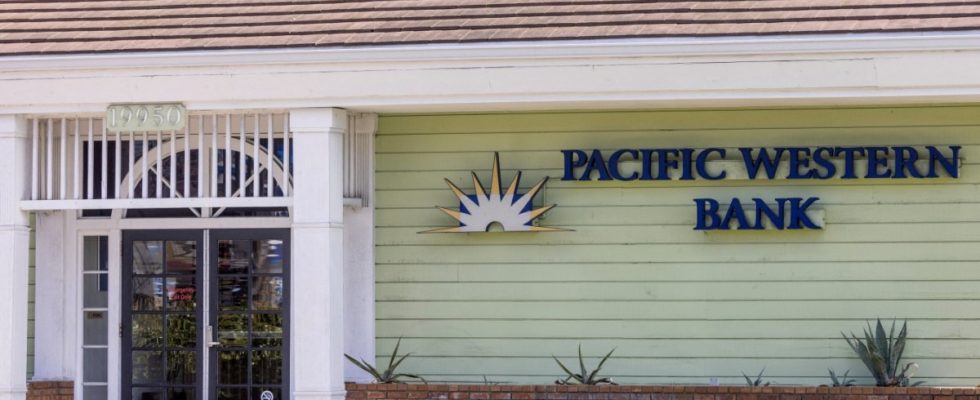It was just a breather after struggling First Republic Bank was bailed out by banking conglomerate JP Morgan on Monday. The turbulence at the US regional banks continues: in the past few weeks, four institutes have already collapsed, with Pac-West Bancorp from Los Angeles it has now hit the next bank. The bank is examining “all options,” it said on Wednesday evening. In other words, you want to save what you can save, whether it’s a sale or fresh capital or something else. Shares fell 43 percent Thursday in premarket US business. The prices of other regional banks also fell sharply.
Pac-West tried to reassure investors on Thursday: There have been no unusual outflows of deposits since JP Morgan rescued the First Republic on Monday, the bank assured. It probably didn’t help. Since the crisis in the regional banks began in early March, the shares had lost almost 90 percent of their value. Even a capital increase was no longer enough to permanently stabilize the situation.
The trigger for the worst banking crisis since the 2008 financial crisis was the collapse of the Silicon Valley Bank in early March. Many investors then withdrew their money from regional banks. “Trust in a financial institution is built over decades and destroyed in days. When a domino falls, the next weakest bank starts to tremble,” hedge fund investor Bill Ackman wrote on Twitter, urging regulators to fully protect customers’ deposits. “Until investors are rewarded for betting on a shaky bank, there will be no bid,” he wrote.
Large banks and private equity firms had therefore refused to offer capital to regional banks without state backing. They fear losses from the loans and investment portfolios of the financial institutions. Above all, the increase in interest rates is causing problems for the regional banks. Before the rate hike, they had invested in US government bonds, which are now worth less. The US Federal Reserve raised interest rates again on Wednesday. The country’s banking system is resilient and bank deposits have stabilized, said Fed Chair Jerome Powell.
Many offices in the US are empty
Legendary investors like Charlie Munger, a confidante of billionaire Warren Buffett and vice president of his investment firm Berkshire Hathaway, are less optimistic. In the Financial Times he warned a few days ago that US banks were “full” of “bad real estate loans”. The situation is “not nearly as bad as in 2008,” said the 99-year-old investor. Back then, during the financial crisis, Berkshire Hathaway had invested in many struggling banks. But: Many banks would already withdraw from real estate financing. The basic problem: After Corona, many employees did not return to their offices. Companies are therefore allowing their leases to expire. Added to this are the layoffs of the tech companies. This depresses rents and prices, and there are also rising interest rates that make follow-up financing more expensive. In the worst case, the companies no longer pay their rent and simply give the property to the bank. All of this is currently affecting the regional banks in particular, which are heavily involved in this market.
As is always the case on the financial markets, this is not just a local phenomenon: many banks in Europe, above all some from Germany, have also become involved in the US real estate market – most notably Aareal Bank from Wiesbaden relative to its size. According to the rating agency Fitch, the real estate financier has outstanding loans for US commercial real estate totaling eight billion euros, more than three times the core capital. So the bank cannot afford any major defaults there, as that would immediately eat up the reserves. But the Landesbank Hessen-Thüringen (Helaba) is also clearly at risk. It has issued $11 billion in US commercial real estate loans, roughly equal to its entire core capital. Deutsche Bank, in turn, has lent a total of 17 billion euros there, which corresponds to around 38 percent of its equity, and is therefore “easily managed” according to CFO James von Moltke.
So will the looming real estate crisis in the USA spill over into Germany – like in the financial crisis, when the slump in house prices in the USA soon also resulted in large losses on the balance sheets of domestic banks? In fact, the share prices of domestic financial institutions have also been under significant pressure for a few weeks. For the time being, however, the Fitch rating agency has given the all-clear: The exposure of German banks to commercial real estate is high by European standards, according to a recent study. But none of that would be a cause for concern: many real estate loans are well secured and the leases are long-term. So as long as the tenants pay, there won’t be any major problems. But that might be the big unknown.

